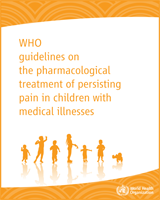All rights reserved. Publications of the World Health Organization are available on the WHO web site (www.who.int) or can be purchased from WHO Press, World Health Organization, 20 Avenue Appia, 1211 Geneva 27, Switzerland (tel.: +41 22 791 3264; fax: +41 22 791 4857; e-mail: tni.ohw@sredrokoob). Requests for permission to reproduce or translate WHO publications - whether for sale or for noncommercial distribution - should be addressed to WHO Press through the WHO web site (http://www.who.int/about/licensing/copyright_form/en/index.html).
NCBI Bookshelf. A service of the National Library of Medicine, National Institutes of Health.
WHO Guidelines on the Pharmacological Treatment of Persisting Pain in Children with Medical Illnesses. Geneva: World Health Organization; 2012.
This guideline has been retracted by the World Health Organization.

WHO Guidelines on the Pharmacological Treatment of Persisting Pain in Children with Medical Illnesses.
Show detailsThis annex reports the detailed considerations by the WHO Guidelines Development Group for each recommendation as mentioned in Chapter 4. Improving access to pain relief in health systems. They were formulated at a meeting held at the Rockefeller Conference Center in Bellagio, Italy, in March 2010. These recommendations arise from an appraisal of the evidence retrieved and reported in Annex 4. Evidence retrieval and appraisal, considerations and recommendations from the WHO policy guidelines Ensuring balance in national policies on controlled substances: availability and accessibility of controlled medicines (95) and additional evidence and values.
Health systems question
What is the evidence for the use of task shifting from medical doctors to other health professionals in prescribing, titrating and monitoring opioid analgesics to ensure rapid, effective and safe pain control?
Recommendations
- 20.
Education of health professionals in the standardized management of persisting pain in children with medical illnesses and in the handling of the necessary medicines, including opioid analgesics, is encouraged.
- 21.
Health professionals will be allowed to handle opioids within their scope of practice or professional role based on their general professional licence without any additional licensing requirements.
- 22.
In addition, countries may consider, subject to their situation, allowing other professions to diagnose, prescribe, administer and/or dispense opioids for reasons of flexibility, efficiency, increased coverage of services and/or improved quality of care.
- 23.
The conditions under which such permission is granted should be based on the demonstration of competence, sufficient training, and personal accountability for professional performance.
Guidelines Development Group experts' opinion
Domains and considerations
Evidence
Reference is made to the Cochrane Systematic Review on substitution of doctors by nurses in primary health care (118); to the bibliography reported on the 2008 WHO guidelines on task shifting (111); and to the tables on health system interventions, and opioid analgesics prescription and pain services in Uganda and the United Kingdom, and in the Indian State of Kerala and the Malaysian State of Sarawak. (See Annex 4.2, Studies retrieved on health system recommendations.) Guideline 11 of the WHO policy guidelines for Ensuring balance in national policies on controlled substances also supports the recommendation that no health professional should require additional licensing to handle opioids: “Appropriately trained and qualified physicians, and, if applicable, nurses and other health professionals, at all levels of health care should be allowed to prescribe and administer controlled medicines, based on their general professional licence, current medical knowledge and good practice without further licence requirements.” (95)
Values
The panel places high value on management of pain.
Research
More documentation is desired which considers both qualitative and quantitative data on health-system interventions around the delegation of tasks from medical doctors to other health professionals to ensure service coverage for pain relief in national health systems.
- BACKGROUND TO THE HEALTH SYSTEM RECOMMENDATIONS - WHO Guidelines on the Pharmaco...BACKGROUND TO THE HEALTH SYSTEM RECOMMENDATIONS - WHO Guidelines on the Pharmacological Treatment of Persisting Pain in Children with Medical Illnesses
Your browsing activity is empty.
Activity recording is turned off.
See more...